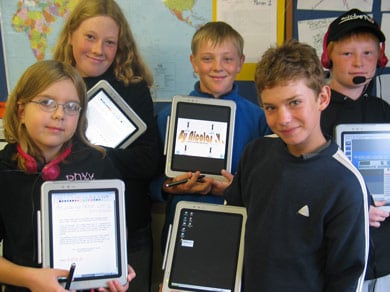 Since then, printing technology has continued to improve but not until recently has there been another complete overhaul. First, personal computers re-thought desks and may have helped us at work but they still didn't quite replace the book. (I think its interesting that Steve Jobs who was influential in the death of written material appreciated very much fonts, typeface and feel of letters, its almost as if he, the father of the revolution, wanted to preserve a vestige of a culture he was about to lay waste to, but was I'll post about him later.) Then came the kindle. Now we have these book-like tablets that can hold loads of books and don't waste paper or have to buy a new editions each time there are changes or edits. The pros and cons are many and the debate continues where ever people consider buying a tablet.
Since then, printing technology has continued to improve but not until recently has there been another complete overhaul. First, personal computers re-thought desks and may have helped us at work but they still didn't quite replace the book. (I think its interesting that Steve Jobs who was influential in the death of written material appreciated very much fonts, typeface and feel of letters, its almost as if he, the father of the revolution, wanted to preserve a vestige of a culture he was about to lay waste to, but was I'll post about him later.) Then came the kindle. Now we have these book-like tablets that can hold loads of books and don't waste paper or have to buy a new editions each time there are changes or edits. The pros and cons are many and the debate continues where ever people consider buying a tablet.In the end, you can debate it all you want, but price tends to be one of the best guides of how practical things are. If I can get the same book more cheaply and quickly on a tablet, eventually the shift will happen, though as yet print has proven resilient. Another salient advantages of a tablet is as a space saver, so where space is at a premium like in a small apartment, in the city or trudging through the desert sand, sweatily lugging around a bunch of books, a tablet should win. The fall out of of the subsequent shift to digital has already been substantial: small or weakly managed newspaper, magazine and book companies have been gone out of business and many jobs lost(1), although some larger well capitalized companies with forward thinking management have successfully transitioned to online and e-books. But the floodgates are now open and I don't think the digital wave will relent.

We can guess that the next in line are slower moving institutions like schools and I still wonder what will become of libraries if books become obsolete? One version of a book-less library attempt is already underway in San Antonio Texas. (4)
In schools, billions of dollars and more importantly, children's minds are at stake on when an how tablets will relate to textbooks. With the promise of didactic games and easy monitoring of students activity, convincing academia is all too easy. Teachers agree, it makes and sense so why hasn't it happened yet? Well, while there may be a huge potential future in filling schools with tablets, who exactly will stake a claim in this wide open territory is currently in serious contest. Doing it right is what really matters and real improvements don't usually happen the way we expect them to. Trying to get something as complex as a computer that is as intuitive and durable, in short, re-inventing the textbook, is not exactly child's play. In LA they've tried just throwing full size i-pads at kids with mixed results.(2) Remember, we're dealing with kids, probably one the most un-predictable force in the universe. In Bridge, the for-profit, mass-education enterprise in Africa, they use tablets in class in a different way, to give the curriculum solely to the teacher. Personally, I'm kind betting on Amplify as a major player in the US. They are probably most aggressively pursuing and trying to profit from tablets in schools though with no major success yet.(3) So yes, tablets may largely replace books in schools, but we can expect some failures and wasted government and corporate resources before someone gets it right. I'm sure though, with the right incentive and vision some very smart, motivated and focused people could get it done, but when those elements will combine nobody knows for certain. My own relationship with a tablet has come a long way, I started out neglectful but have since found myself using it on occasion, still its not anywhere close to books yet.
*http://en.wikipedia.org/wiki/File:Literacy_rate_world.svg
**Other episodes http://vimeo.com/11891919 , http://vimeo.com/11891958 , http://vimeo.com/11891958# ,
http://vimeo.com/11892454, http://vimeo.com/11892516 also interesting http://darwinslibrary.com/
1) http://newsosaur.blogspot.com/2012/04/four-ways-newspapers-are-failing-at.html
2) http://www.latimes.com/business/hiltzik/la-fi-mh-ipad-adventure-20131120,0,942881.story#axzz2n3JmPH8H http://www.macworld.com/article/2065460/ipads-in-schools-the-right-way-to-do-it.html http://www.npr.org/blogs/alltechconsidered/2013/10/25/240731070/a-schools-ipad-initiative-brings-optimism-and-skepticism
3) http://mashable.com/2013/08/29/news-corp-education-tablets/
http://www.geekwire.com/2013/tech-tablets-schools-mix/
http://slashdot.org/story/13/10/08/1952215/nc-school-district-recalls-its-amplify-tablets-after-10-break-in-under-a-month
4)http://www.latimes.com/books/jacketcopy/la-et-jc-nations-first-bookless-public-library-system-opens-20140107,0,7098801.story#axzz2pmce0gj5

Planing has always a core of every thing and there is nothing which can be completed without planning and that is we are needed to tell our students that if they learn from dissertation writing service so they can make planning and can execute that.
ReplyDeleteWriting revolutions are always a great thing for all the people and we can make the life good. The online writing service are always a great thing for all the people because they have the latest technologies for all the communities.
ReplyDeleteWriting a thought is not more beneficial but most important things write such best term paper work that is inspirational. The inspirational work always is being thought provoking, that motivates and enhances the creative thinking.
ReplyDeleteThanks!
ReplyDelete